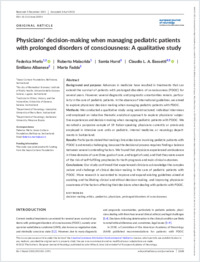Physicians' decision-making when managing pediatric patients with prolonged disorders of consciousness
: a qualitative study
- Merlo, Federica ORCID Sasso Corbaro Foundation, Bellinzona, Switzerland - Institute of Public Health (IPH), Università della Svizzera italiana, Switzerland
- Malacrida, Roberto Sasso Corbaro Foundation, Bellinzona, Switzerland
- Hurst, Samia ORCID Institute for Ethics, History, and the Humanities, University of Geneva, Geneva, Switzerland
- Bassetti, Claudio L. A. ORCID Department of Neurology, Inselspital, University of Bern, Bern, Switzerland - Department of Neurology, Sechenow University, Moscow, Russia
- Albanese, Emiliano ORCID Institute of Public Health (IPH), Università della Svizzera italiana, Switzerland
- Fadda, Marta ORCID Institute of Public Health (IPH), Università della Svizzera italiana, Switzerland
- 2022
Published in:
- European journal of neurology . - 2022, vol. 29, no. 8, p. 2181-2191
English
Background and purpose: Advances in medicine have resulted in treatments that can
extend the survival of patients with prolonged disorders of consciousness (PDOC) for
several years. However, several diagnostic and prognostic uncertainties remain, particularly in the care of pediatric patients. In the absence of international guidelines, we aimed
to explore physicians' decision-making when managing pediatric patients with PDOC.
Methods: We conducted a qualitative study using semistructured, individual interviews
and employed an inductive thematic analytical approach to explore physicians' subjective experiences and decision-making when managing pediatric patients with PDOC. We
recruited a purposive sample of 19 Italian-speaking physicians currently or previously
employed in intensive care units or pediatric, internal medicine, or neurology departments in Switzerland.
Results: Participants stated that making clinical decisions involving pediatric patients with
PDOC is extremely challenging, because the decisional process requires finding a balance
between several contending factors. We found that physicians experienced ambivalence
in three domains of care (time, goals of care, and target of care), and that they were aware
of the risk of self-fulfilling prophecies for both prognosis and main clinical outcomes.
Conclusions: Our study confirmed that experienced clinicians acknowledge the complex
nature and challenge of clinical decision-making in the care of pediatric patients with
PDOC. More research is warranted to improve and expand existing guidelines aimed at
assisting and facilitating clinical and ethical decision-making, and improving physicians'
awareness of the factors affecting their decisions when dealing with patients with PDOC.
extend the survival of patients with prolonged disorders of consciousness (PDOC) for
several years. However, several diagnostic and prognostic uncertainties remain, particularly in the care of pediatric patients. In the absence of international guidelines, we aimed
to explore physicians' decision-making when managing pediatric patients with PDOC.
Methods: We conducted a qualitative study using semistructured, individual interviews
and employed an inductive thematic analytical approach to explore physicians' subjective experiences and decision-making when managing pediatric patients with PDOC. We
recruited a purposive sample of 19 Italian-speaking physicians currently or previously
employed in intensive care units or pediatric, internal medicine, or neurology departments in Switzerland.
Results: Participants stated that making clinical decisions involving pediatric patients with
PDOC is extremely challenging, because the decisional process requires finding a balance
between several contending factors. We found that physicians experienced ambivalence
in three domains of care (time, goals of care, and target of care), and that they were aware
of the risk of self-fulfilling prophecies for both prognosis and main clinical outcomes.
Conclusions: Our study confirmed that experienced clinicians acknowledge the complex
nature and challenge of clinical decision-making in the care of pediatric patients with
PDOC. More research is warranted to improve and expand existing guidelines aimed at
assisting and facilitating clinical and ethical decision-making, and improving physicians'
awareness of the factors affecting their decisions when dealing with patients with PDOC.
- Collections
- Language
-
- English
- Classification
- Medicine
- License
- Open access status
- gold
- Identifiers
-
- DOI 10.1111/ene.15354
- ARK ark:/12658/srd1322451
- Persistent URL
- https://n2t.net/ark:/12658/srd1322451
Statistics
Document views: 109
File downloads:
- Merlo_2022_Wiley_ejn: 233
